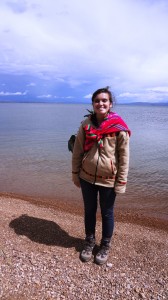By Andria Cubero, history major, UVM class of 2015
On my last day of fieldwork in Potolo, Bolivia- a small village outside of Sucre, I shared a brief tearful goodbye with the woman I had been staying with, and quickly settled myself into a small van alongside 10 or so other passengers from the village who were headed to the city. As we pulled away, the driver asked me with a grin, “Es tu suegra?”- “Is that your mother in-law?” The whole van laughed, and I did too, before explaining that (although it had become a running joke for women to offer the hands of their toddler-age sons to me in marriage) I was actually a student from the US who had come to study the traditional Jalq’a weavings of the area. While the van carried me through the breathtaking beauty of the Andean countryside, I reflected on the drivers comment and on everything that I had done in Bolivia. I was astonished that I had actually made it to this remote place in the world with my own two feet, that I had just finished doing real research, and that I had managed to make great friends with the people who had helped me along the way.
As a history major, my study abroad experience in Bolivia (through the SIT Bolivia program in Spring 2014) has been essential to my understanding of the discipline and my time at UVM. In immersing myself in Bolivian life I got a crash course on the historical context that created the culture which exists there today. I learned about the riches of Cerro Rico that funded the Spanish Conquest and then I set foot inside the mines there myself. I studied the history of religious syncretism that influences the carnival celebrations and then got the see the beautiful parades with my own eyes. I learned about the Cochabamba Water War of 2000, where the people of the city unified to eliminate a large international company that had privatized their water supply, and then I met the leaders of the movement. Spending time in any country gives you the opportunity to understand its history in a way that you would never be able to do by just looking at the documents. Real experience in a place that takes you out of your comfort zone is crucial in developing an understanding of any culture, and any history, that is different from your own.
Studying abroad also provides an opportunity for personal growth. My time in Bolivia inspired me to write a senior thesis and to apply for a Fulbright grant when I came back to UVM. I learned from my experiences that I should never question my own abilities or limit myself. UVM makes it easy for students to integrate studying abroad into your education. The idea of leaving your family and friends behind for a few months may be daunting- and the journey certainly comes with its hardships, but the growth you will experience and the friends you will make across cultural boundaries is worth the discomfort a thousand times over.

